
|
Media Bar
Ellen Sander's
|
Saturday, May 27, 2006
China's shifting labor model
from Salon.com in the How The World Works blog, a fascinating piece on China's tight labor market "remaking" the global economy--again. I posted a few weeks ago about the 112 Chinese construction workers on my flight from Beijing to Tel Aviv, and at that point I was intrigued because I know there are also tens of millions of farmers unemployed in China. Usually they migrate to Chinese cities for work, so seeing a large crew going out of the country for work under legal supervision surprised me. This article helped connect the dots.
You're Invited!
You, the mayor of Jaffa and the ambassador from Spain are invited to this auspicious opening in the Old City of Jaffa, Tel Aviv.
(click to enlarge images) 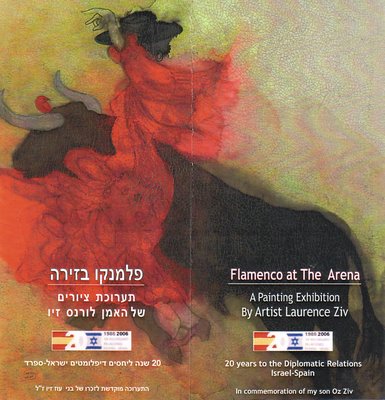 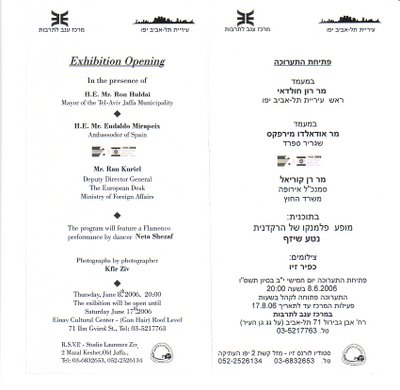 Enjoy!
Friday, May 26, 2006
On the ground in Israel; life here
Today at lunch Yaron asked me if I thought of Israel as a good place to live. We were in a restaurant in a new cluster of businesses, bars and eateries overlooking the beach in northern Tel-Aviv. The weather is getting hot here already, it's gone from mild and balmy to grazing the 90s (F) in the 22 days that I've been here.
I've been here long enough to be disabused of the idealistic notions many people, including me, come here with--actually, that took about 2 days. Its a good life here, but a hard one. You have to live with having close and active enemies, living expenses are high and so are taxes. Services are good but not great. Sometimes people are really rude. Gas is astronomically high (Sondra told me that it's a state secret where the gas comes from.) Some taxi drivers are not as, uh, personable as others. But that aside, its a clean and thriving place and regarding danger--yes the terrorist threat is high, but the intelligence and law enforcement activity is also intense, which keeps the civil crime level fairly low. Yaron felt like he was in more danger when he was in New York and I'd have to agree. As I said in a previous post, you get used to high security pretty quickly, its just a necessary and normal part of life here. Some people I know would find it pretty hard to deal with day in and day out. Now the drivers, they're dangerous! Oi yoy yoy!!!! Aggressive,inconsiderate and oblivious, they knot traffic, blitz in and out of lane like the white lines don't exist. Traffic lights? What're they for? Murray said that Israel has lost more citizens to road accidents than from all the wars and attacks combined. There are beautiful modern cities and older towns with the kind of outdoor marketplaces that Joseph and I used to love to roam, a diverse population, culture up the wazoo, impressive universities that Israelis, Palestinians and Druze attend together (please note) and above all great kids. These kids are irrepressible and so outspoken and bright. (I hear the nightlife is great, but these days I'm in no mood for nightlife. Maybe next time. There's certainly going to be a next time.) "All this from nothing," said Yaron, referring to the practically barren land that was Israel 58 years ago when it was reborn. "Built these cities, irrigated the land and revived an ancient language." Murray came in while Sondra and I were writing this afternoon after I got back to Petach Tikva and said he'd just gotten an email from the American Counsulate warning all Americans to get out of Gaza because they're expecting civil war there. (What the hell would Americans be doing in Gaza these days, I wonder?) Yesterday we were visitng Paula-- another of Sondra's daughters-- and her family in Ma'ale Edumim, a settlement very near Jerusalem that will probably be in the news soon as there is regular hostile activity around there and settlement expansion is under consideration. The Israelis want to develop some more hilltops to thwart the continuing threat. They have to make separate roads for the Israelis and Palestinians, duplicate roads that go to the same places, to deter Palestinian sniping on the highways. While I was on the bus to the Dead Sea, there was the famous fence between the highway and the Arab villages and set in the fence was a 20x60 (feet) slab of decorated cement inserted along the fence. It looked ornamental, but a bit out of place. The driver said it was put there because snipers had been firing at the highway traffic from the tower of a Mosque on the next hill. As we cleared the cement panel, you could see the tower. They just patched the line of sight out of the "wall" (which for most of its length is really a high fence of heavy wire). I didn't have the composure to ask how recently the slab was installed, but it looked fairly new to me, say, under 2 years old. The wall is still being expanded. It has reduced causuaties from rockets and snipers enormously and nobody here gives a flying frack if loopy leftists think that it's inappropriate or worse. It's saved lives, a lot of them, and it'll keep growing as long as its necessary. "If there were peace," said the bus driver on the Dead Sea trip I blogged in the last post, "look, we could turn left right here and go to Jordan." He indicated a highway exit with a serious checkpoint. "We could go through Turkey and drive right to Europe if there were only peace!" Shabbat Shalom.
Tuesday, May 23, 2006
Masada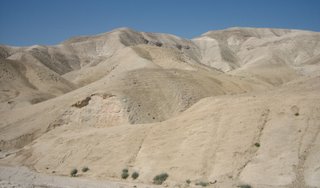 I take it back, I had at least one more sightseeing jaunt left in me and I am so glad that I went. I take it back, I had at least one more sightseeing jaunt left in me and I am so glad that I went.We drove past Jerusalem, 800 meters above sea level, down to and through the Judean desert to the Dead Sea, 400 meters below sea level, the lowest point on Earth, in just 35 minutes! We passed the 7000 year old city of Jericho. Across the Dead Sea, in the mist and the distance, is Jordan. There in the desert a cragged mountain with a flattened top, distinct from all the rest, rose majestically -- Masada--- where King Herod built his fortress and palaces, and where about a thousand Jews took refuge in the year 73 during the Roman occupation and lived in defiance of the Roman incursion. 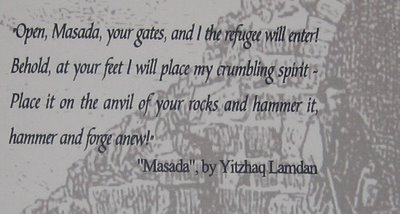 The Romans had with them an "embedded journalist" the historically controversial Josephus Flavius, who kept eloquent documentation of these events. Fearing these Jews, the last holdouts, would be the incentive for another uprising, the Romans tried for months with ten thousand men, to conquer Masada, but they were held back by the geographical protection the fortress provided, by the ingenuity and persistence of the zealots and by some fortuitous, perhaps godsent, meteorology. With their thousands of troops the Romans eventually overran Masada. But those Jewish zealots, would rather die than face the consequences of capture. The Breaching Point Here the siege of Masada ended. The ramp that the Romans had built up to the summit of the mountain reached to below this point. At the top of the ramp rose the siege tower and in it was the battering ram with which the Romans assaulted the casemate wall. However, the rebels had built a wall of earth and wood, against which the battering ram was ineffective.In the sixties, all this was excavated and I can only imagine the ecstasy of the archaeologists to find such a magnificent treasure so complete. Masada was very emotional for me. Several times I felt the big weep approach the brim and subside. The metaphors of jeopardy and courage that Masada evokes are powerful. The immensity and monochromity of the desert are mind-numbing. It was hot, it was mid-day by the time we took the cable car back down. Some of my fears had incinerated in the desert sun and I felt a gentle and familiar strength returning. After Masada, we went to a funky little "mineral beach" on the Dead Sea. Wading in you immediately sink into this goosh and then there are some rocks and seems kind of treacherous as you pick your way into the water. Then you sit down in the water and you just bob like a cork, floating over all the rocks, as buoyant as if you had your derriere in a swimming tube. A moment of paddling around in the warm murky water, full of nourishing minerals and you relax and look around, past the other bathers. The goosh is Dead Sea mud, which everyone rubs all over their skin. When you shower it off, your skin is like velvet. On the other shore, in the distance, is Jordan. The words of Swing Low Sweet Chariot floated into my mind: I looked over Jordan and what did I see coming for to carry me home A band of angels coming after me coming for to carry me home
Sunday, May 21, 2006
report from the West Bank
I've been seeing lots of sights and to tell you the truth, I'm burning out on sightseeing, but yesterday I visited my friend Leeanne and her family in Beit Arye on the West Bank. They started building their house 21 years ago and have been living there for 17 years, now with garden, fruit trees, all built on soil they brought in. The settlement was bare stony desert ground on which nobody lived, in other words, no one was displaced by the development there. Driving there we saw Arab vilages, Beduin encampments, an American Army base and as we ascended the hills, the sea on the horizon in the afternoon lights. The Israeli and Arab villages nestled each on their own hillsides. But here, see for yourself:
WEST BANK VIDEO In case your browser (in particular you Mac users) won't run this video, here's the script: telescript: Hi, this is Ellen Sander on the West Bank. That was is my friend Leeanne in the Israeli settlement of Beit Arye (pronounced: bet are yay), where she lives and this, on the next hillside is Luban, an Arab village. You see how close they are. The town councils meet on a regular basis here and have an essentially friendly relationship. Men from Luban come and work in Beit Arye and women shop in the grocery store. A small area of peace in the disputed territory. And I want to tell you that it wasn't that hard to find. Leeanne told me this story as she was showing me around. Last summer some mischevious teenage boys (her word for them was morons) from Beit Arye went over to Luban to that mosque tower that you see and set off firecrackers. The Arab police found them, gave them a good scare and then called the Beit Arye town police to come get them before they got themselves killed. Until recently she'd been going to another Arab village to buy olive oil, but that town was not as friendly as Luban, or more precisely, their government was under more pressure from Palestinian authorities, so the road was blocked with a pile of stones so no car could get through. You could get through with a Jeep if you wanted to but the message was clear and everyone observed it. Leanne said she didn't like the word "settlement" to refer to Israeli developments in the disputed territories. To her it sounded like remote primitive outposts. These are much like middle-class American suburbs with single family homes, each community with its own infrastructure, school and local commerce. The roads are good. I told her that to me, at least, what it signified was a recently built area of multiple homes. But how it came to be called "settlements" in Engish is that the translation of the Hebrew word for this kind of community in the disputed territories, yishuv, is "setted area" and thats how the term got Anglicanized. Of all the sights I've seen, this one was the most moving, the most significant and the one I'll remember the most profoundly. Other than that thousand year old olive tree in the previous post--I've seen many of them since, some may be as old as 3000 years.
Friday, May 19, 2006
Thousand Year Old Olive Treerosebud tea and cardamom pods radish and melon aroma of fruit flower and memory shifting through awnings an urn grows in my hand its weight tips and falls breaks pieces roll like cups spilling like bones like heartbreak drop like sparrow eggshells stolen by jays contents oozing they roll along the pavement the old woman sleeping on the sidewalk pushes them away in her dream her sleep a merciful hour that softens invisible dread in my aching palms are pearls that crumble but stay strung together covered in this dusting of ashes ES, Israel 2006 Shabat Shalom May 19
Tuesday, May 16, 2006
Jerusalem: From the Great Wall to the Wailing WallPart I - the Old City The way up to Jerusalem from Tel Aviv is at least as interesting as the destinations. I pluralize destinations because there are several Jerusalems, and they connect antiquity to modernity with exasperatingly diverse linkage. Early in the morning there was ground fog in the olive groves along the highway, bright lemony mimosa exploding through the mist as big hooded crows flapped in the air. Once out of the city and surroundings, ancient terraced hills rose gently from both shoulders and the highway at many points followed what was the pre-1967 border between Israel and Jordan. There were no roadside villages or businesses then, only gunfire and minefields. Stone villages, both Israeli and Arab gave way to more prosperous towns with homes and villas all faced with Jerusalem rock, as dictated by heritage ordinances. The prosperous towns were both Arab and Israeli, close to one another but not mixed. One Arab neighborhood, which 25 years ago had only one restaurant, was rife with bistros and eateries, brilliant bougainvillea cascading over their railings. On Fridays and Saturdays when all the Jewish establishments are closed for the Sabbath, they are always full of Jews dining out. It appears that when prosperity is in the mix, Arabs and Jews get along just fine in Israel. I learned that, contrary to popular perception, only about 1 percent of the Arabs in Israel are struggling in refugee camps. Up through the Mount of Olives you could feel the altitude rising and the humidity diminishing. It was green, green, green, with verdant forests of some of the 250 million trees planted in Israel since it became an independent Jewish state. So much has changed in this tiny vibrant country of only 7 million people. Israel is as small as Rhode Island, the smallest of the United States and its population is less than that of the city of New York. Stopping at Hebrew University, you could see the Old City, within whose walls were ancient and revered churches, temples, mosques of all the world religions that originated in the Middle East. It was a heart-stopping sight. The thing that amazed me the most, though, was how much less inspiring it was when I actually got there. Oh, the architecture, the history, the labyrinth of tunnels, caves, marketplaces and the beauty of the religious artifacts and shrines are impressive. But there is a tension there that does not come from the tourists and pilgrims but from the operators and custodians of the various religious sites themselves. Emblematic of this is the gate of the Church of the Sepulchre where the various Christian factors are so competitive about whose province and property it is, that it is a Moslem who holds the key to keep the infighting under enough control to allow tourism and pilgrimages to come. Elie, who has lived in Jerusalem since his family emigrated from Tunisia in 1949, said, "problems up to here," as he floated his open hand mid-forehead. When the floor is mopped, a bench is placed between two competing Christian exhibits so the mop from one doesn't touch the floor of the other. The Copts and the Roman Catholics both say they have the only stone slab that covered the tomb of Jesus and call one another historical liars over it. You can really feel this, even though the pilgrims are so devout and the tourists more respectful than anywhere else I'd been. I give you that faith is important to the lives of most people. And it seems indisputable that faith is most popularly served wrapped in ritual, artifact and places of worship, governed by hierarchies of clergy in service of various forms of deities. But how faith came to be competitive and combative is the scourge of mankind and it is worse today than ever. I am not denigrating faith. I have faith. I need faith. Faith has served me well. At this moment, on this journey, I am mid-air in one of the biggest leaps of faith I have ever made. But the structures of faith as they became political and competitive have ruined life on Earth and nowhere was it more palpable to me than in this holiest of holy places, the holy land of so many faiths. I do not go within walls for faith, I go within myself. I was no less put off when I came to the Jewish quarter and the West Wall, a.k.a. the Wailing Wall. I'd forgotten that there was a separate and separated section for men and women. I grew up in a reform Judaism where women could be cantors and rabbis and hold offices in a synagogue's administration. But Jewish orthodoxy is segregated. The Wall was still holy to me in its age and purpose as the place of hope and prayer in the Promised Land for the survivors of a people who had been under siege for centuries-originally for not accepting a different version of God when Jesus, a Jew himself-was deified. I put my hands upon the Western Wall and the tears welled up from the depth of my bones, my being and my heritage. Beyond what you can see, it goes 30 meters into the ground! I was raised to revere it and that is a part of me. But it was the contradiction as well that stayed with me and always will. I was at my most comfortable simply admiring and experiencing the age and true beauty of the contents Old City. I walked the path over which Jesus pulled his cross, each place he fell marked and noted. The Tomb of Mary is lovely and tranquil and its mosaic ceiling is gorgeous. But as fortunate as I feel to have had the opportunity to go there in my lifetime, I was glad to get outside of the walls of Old Jerusalem. It's a miracle that the Old City still stands and much surveillance and technology is employed to keep it standing because it is under pressure from without as well as within (Bethlehem is all but closed right now). But, you know, I'm a Jew. I yearn for a bigger more encompassing miracle even as I become resigned that it's probably not going to happen in my lifetime. ButI did like those bumper stickers and T-shirts that said "Don't worry America, Israel is behind you!" More to follow. It was a long day.
Sunday, May 14, 2006
Happy Mother's Day
To all mothers, grandmothers, godmothers and mothers-to-be, we cherish and honor you today. A mother's day email from my son and beautiful daughter-in-law illuminated my horizon with love this morning and I can't imagine anything more life-affirming and precious.
A special mother's day wish to my mother in heaven, thank you for my life and for your strength and everlasting love. Shalom from Israel
Thursday, May 11, 2006
Promised Pictures from the Promised Land IHi, A couple of days ago I moved from Tel Aviv proper where I stayed with Yaron & Anabell and their kids Ben and Mai to Petach-Tikvah, in the suburbs. Yesterday Sondra and Murray took me to Haifa, where while Sondra was teaching her class, Murray took me to the museum and to a Druze village in Carmel. Here are the pictures I've been promising. Click on them to see the larger image. Yaron, Ben, Mai and Anabell at dinner in their stylish new apartment. Ben, Yaron and Mai Haifa University Haifa University Museum 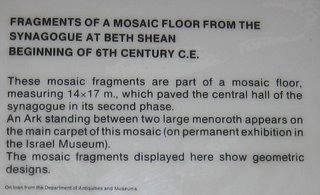 (This one is really worth enlarging. Click away.) ~~~~~~~~~~~~~~~~~~~~~~~~~~~~~~~~~~~~~~~~~~~~~~ And last but not least: 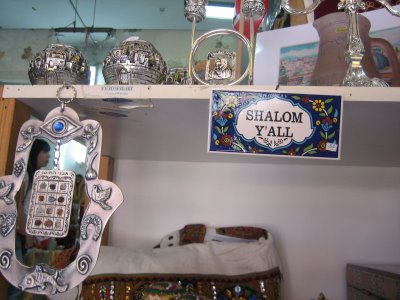 From a gift shop in the Druze village
Saturday, May 06, 2006
Day 2 in Tel Aviv
Last night we had Shabbat dinner with Yaron's parents who live in a special and particularly beautiful neighborhood called Neve Tzedek which means Oasis of Justice. It got that name when Tel Aviv separated from Jaffa, around the turn of the century, when Jaffa was under Arabic control. Dinner was wonderful. I even got to have chicken soup (with a mideastern flavor that I think was cumin, and no matzoh balls).
This morning I walked around the old port of Jaffa, which is now a part of Tel Aviv. It was almost deserted. Most of Israel is closed on Saturday, the Jewish Sabbath, but it's business as usual on Sundays. The kids get off early on Friday but the school week starts again on Sunday. No wonder they're so sharp! The beautiful old buildings in the towering Jaffa old city compound that lines the ancient tunnels, stairwells and alleyways have been turned into an artists' quarter and as I made my way through them, the emptiness echoed with history. The port itself these days is a funky aged marina with mostly small fishing and transport boats, where bells ring, engines stutter and men play backgammon along the walkway. Walking out of there, I passed an open seaside restaurant, where people were having breakfast. As customers entered, they were screened for weapons with that metal detection paddle that they use in airports. You get used to seeing that pretty quickly. The consciousness of peril is so pervasive that it is just another component of the cultural landscape, which is to say that attention is autonomic and normal. That's why its so very very safe here. I've picked up a few salient Israeli facts, namely that Israel's founding father Ben Gurion's name was David Green before he changed it, and and that he eventually became a Buddhist. That the most popular tourist destination for Israelis is Turkey. There are lots of Turkish restaurants here, I'm told, but I haven't tried one yet. On the practical side, ten shekels is about $2.25 US. I love saying shekels, its how money should sound. When I got back from my wandering, I tagged along while Yaron took Ben and Mai rollerblading, a jaunt which ended abruptly when Ben took a tumble and skinned his knees. They went home to fix it up and I perambulated along the road following the seashore and had some of the delicious mint leomonade popular here before I found my way back home. I think I've made a record recovery from jet lag, I feel fit and awake today. Sorry, still no pictures. I think the cord for the camera-computer connection is in the box of weighty electronic miscellaney in my computer case that I shipped ahead to get around carrying it inflight. (Thanks, SS!) It should be here soon. Other than that, I have to say that I am really enjoying Annabel's wonderful cooking. I'm so lucky to land in such a loving and wonderful household in this tree-lined neighborood for my first stop on the road to who knows what. Yesterday I helped Yaron install Skype on his computer and right now Annabel is talking to her sister in Brazil! It's too cool to rule that the wireless internet signal around here is more often than not fast and strong and I can Skype and blog whenever I feel like it (if I'm not playing backgammon with Ben, who beats the bluejeans off me most of the time). UPDATE: Never say that! Never express confidence about network connections anywhere it can read or hear you. Signal just went south for a few hours; now its back. I promise to approach connection with trepidation from now on, do you hear that lord of the bits?
Friday, May 05, 2006
Shabbat Shalom from Tel Aviv
Still bleary from jet lag, Yaron, Ben, Mai and I (pictures maybe tomorrow) just ate felafel in the middle of Tel Aviv. For various reasons, I am on the road and the first stop is Israel. I arrived here from Beijing at a gawd-awful hour of the morning; a smiling Yaron welcomed me to the Holy Land, but quickly said "you'll find not much is holy anymore."
When I arrived at the El Al station at Peking Airport last night, more than 3 hours before my flight, I endured a 40 minute tag-team security interview. They were a big suspicious of my one-way ticket with no definite continuing travel plans. I eventally passed the interview, which included describing my son's Bar Mitzvah to prove that I was Jewish! But I understand why this has to happen and when it was over, I thanked "Ron" for working so hard to keep us safe. I was worried about overweight luggage and more than the allowed one piece of carry-on baggage (I could have stuffed it all into one piece, but thought it'd be easier on security to keep the computer separate)--but they didn't even bother with that. (!!!) Over 112 Chinese men and a couple of women construction workers took up almost the entire rear cabin. They were contracted to work in Israel under (and only for) the contractor/foreman that led their group. China is exporting cheap manual labor to Israel! Amazing. It was probably because of that rather than passing my rigorous interview with flying colors that I was upgraded to an economy plus seat in a cabin between business and economy with only six rows. And I was the only one in the cabin that had the window plus the aisle seat to herself. What a nice luxury. Still, the 12+ hour flight (it was somewhat late, but who's counting) was more comfortable than usual and I certainly appreciated it. A good omen. This will be a long journey. Before we went to Yaron and Annabel's new apartment on Sokolov, Yaron took me to the sea. There is nothing like the color and the scent of the Mediterranean. The waves lapped against the shore in the early morning light and sang me home. So here I am. Here I am. Shabbat has started, traffic is gnarly and tomorrow, says Yaron, everything to do with business is closed but everything to do with having fun is open. Shabbat Shalom. |

Mainer, New Yawka, Beijinger, Californian, points between. News, views and ballyhoos that piqued my interest and caused me to sigh, cry, chuckle, groan or throw something.
Previous PostsBostonPaul Williams Happy Birthday YOKO. It is an amazing experience b... Warm up the house, free Be My Valentine Happy Holidays and Bonne Année 2013 The Rolling Stones! Incorrigible. “A Christmas Carol” The obesity challenged lady gets ready to sing - R... Awaiting storm w Neil Young - Hurricane! Terror Alert Status LinksBaseball CrankThis Modern World The Peking Duck The Talent Show ESWN Simon World Angry Chinese Blogger Angry Chinese Blogger mirror Open Letters to GWB ArchivesWeb GizmoTechnorati ProfileSite Feed 
Search
|
||
 The text of this work is licensed under a Creative Commons License, except those items which are cited, which belong to their original copyright holders. The photos and cartoons belong to their original copyright holders. |